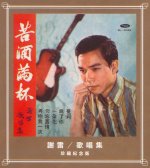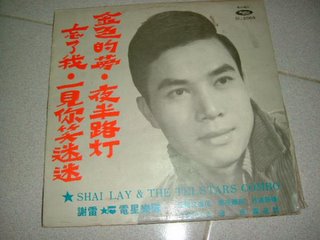Tuesday, February 28, 2006
Bungo Podcast
Japanese Classical Literature at Bedtime offers podcasts of Genji Monogatari, Oku no Hosomichi, and others.
Saturday, February 25, 2006
New Chinese Characters
Chinese-tools and Sinosplice have some pretty funny "new Chinese characters" created by foreigners--character-readers of both Hanzi and Kanji persuasions will be able to get the jokes.
These made me think of the artist Xu Bing, who writes English in character-form (take a look and you'll see what I mean).
These made me think of the artist Xu Bing, who writes English in character-form (take a look and you'll see what I mean).
Friday, February 17, 2006
$1 Million Bill
Did you read the story about the Japanese investors who were scammed out of millions by someone selling fake million dollar bills? I had to read this sentence a couple times before I got it:
The president [of a construction company] showed them a thousand of the $1 million notes featuring a portrait of George Washington at a Tokyo hotel, according to Asahi.George was apparently in town to shoot a Suntory whiskey commercial.
Sunday, February 12, 2006
Words Which Mean Their Own Opposites, Part 2
Another word that means its own opposite from AC Muller's CJKV-English Dictionary:
沽
To sell (an article, object). To buy. A wine seller. A huckster, hawker, peddler. Negligent, careless, remiss.
Though, I think if a word means "buy" and "sell," it might be better understood as meaning "trade" or "barter."
沽
Though, I think if a word means "buy" and "sell," it might be better understood as meaning "trade" or "barter."
Tuesday, February 07, 2006
Taiwanese Pop Gets Boing-Boinged
Boing Boing picked up a post about a 1960s Taiwanese pop band called the Telstar Combo today. The album cover looked great, so I was curious to find out ore about these guys. It ends up they were the backing band for a famous singer named Hsieh Lei 謝雷.
Hsieh Lei hit it big in 1967 with an old Taiwanese song from the 1930s called "Wine Cup of Sorrow 悲戀的酒杯 " which was given new Mandarin lyrics and re-titled "Full Cup of Bitter Wine 苦酒滿杯." The new version was banned under the KMT.

Hsieh had a record store near the Taipei Train Station in those days, and the record was selling so fast they had to restock during the day. Fans would surround the returning truck and buy the records up before they could even be put on the store's shelves.
The record was put out by Haishan Records, the dominant force on the pop scene back then. Their roster included around 80% of the big stars of the 60s and 70s, but they got hit badly by financial troubles in the early 80s. Many of the employees jumped ship and started their own record companies. Haishan is still around, but it only puts out re-issues of the oldies.
Here's a picture of an album by Hsieh Lei (Shai Lay) and the Telstars Combo called "Golden Dream."


Hsieh Lei hit it big in 1967 with an old Taiwanese song from the 1930s called "Wine Cup of Sorrow 悲戀的酒杯 " which was given new Mandarin lyrics and re-titled "Full Cup of Bitter Wine 苦酒滿杯." The new version was banned under the KMT.

Hsieh had a record store near the Taipei Train Station in those days, and the record was selling so fast they had to restock during the day. Fans would surround the returning truck and buy the records up before they could even be put on the store's shelves.
The record was put out by Haishan Records, the dominant force on the pop scene back then. Their roster included around 80% of the big stars of the 60s and 70s, but they got hit badly by financial troubles in the early 80s. Many of the employees jumped ship and started their own record companies. Haishan is still around, but it only puts out re-issues of the oldies.
Here's a picture of an album by Hsieh Lei (Shai Lay) and the Telstars Combo called "Golden Dream."


Sunday, January 29, 2006
Google in China
I am a big Google fan, and I have dismissed a lot of the criticism that they have received recently, but I have to admit I am a little disappointed with the news that their new China portal will filter its search results per the CCP's liking. Some have canceled their Adwords accounts in protest. Since Google works just fine in Chinese as it is, I have been wondering what the point of the whole thing was. Most savvy Internet users in China who would want to find "illicit" information have ways around the Great Firewall, and the majority, sadly, don't care about such stuff anyway. Look at how widely-used the censored MSN Spaces is in China.
I just found this post on Google's official blog that provides some answers:
I just found this post on Google's official blog that provides some answers:
Google users in China today struggle with a service that, to be blunt, isn't very good. Google.com appears to be down around 10% of the time. Even when users can reach it, the website is slow, and sometimes produces results that when clicked on, stall out the user's browser. Our Google News service is never available; Google Images is accessible only half the time. At Google we work hard to create a great experience for our users, and the level of service we've been able to provide in China is not something we're proud of.Fair enough, but I don't think that people using Google via a proxy would have such problems anyway.
Launching a Google domain that restricts information in any way isn't a step we took lightly. For several years, we've debated whether entering the Chinese market at this point in history could be consistent with our mission and values. Our executives have spent a lot of time in recent months talking with many people, ranging from those who applaud the Chinese government for its embrace of a market economy and its lifting of 400 million people out of poverty to those who disagree with many of the Chinese government's policies, but who wish the best for China and its people.I love the self-serving first stance mentioned there--applauding the Chinese government "for its embrace of a market economy and its lifting of 400 million people out of poverty." That's a bit like applauding someone for beating his wife less severely than he used to (and taking him at his word as to the numbers).
No, we're not going to offer some Google products, such as Gmail or Blogger, on Google.cn until we're comfortable that we can do so in a manner that respects our users' interests in the privacy of their personal communications.So they won't be exposing dissidents like some have recently.
And yes, Chinese regulations will require us to remove some sensitive information from our search results. When we do so, we'll disclose this to users, just as we already do in those rare instances where we alter results in order to comply with local laws in France, Germany and the U.S.Google does deserve a bit of credit for this. Users see a little notice in Chinese that says the results have been filtered. Maybe Chinese users will start to wonder why. What would be great is if it said how many results have been filtered out--"Your government's Ministry of Truth is keeping 1,203,089 sites full of information about Taiwan from you. Now go enjoy 'Chinataiwan.org.'"
We're in this for the long haul. In the years to come, we'll be making significant and growing investments in China. Our launch of google.cn, though filtered, is a necessary first step toward achieving a productive presence in a rapidly changing country that will be one of the world's most important and dynamic for decades to come.They say it's a necessary first step. Let's hope they don't mean it's their first compromise of many to come.
Thursday, January 26, 2006
Words which mean their own opposites, Part 1
According to A.C. Muller's extremely useful Dictionary of Chinese, Japanese, Korean, and Vietnamese, the character 汨 can mean:
A river in Hunan. To manage, control. To be in disorder. The flowing through, or passing through (of water). To float. Floating and sinking.
I love Chinese.
I love Chinese.
Monday, January 23, 2006
Mandarin... or Math?
The Chinese-learning craze continues, if we are to believe the flurry of news articles I'm getting every day. There's always something about some school somewhere in the State (or Thailand, or the UK) starting to offer Mandarin classes. There was a NY Times article a couple weeks ago about a Chinese government project to open a chain of Chinese-language schools called "Confucius Institute" around the world (the original is behind their Select Archive wall, but here's a copy from the SF Chronicle).
One poster to a C-E translation-oriented mailing list recently said Chinese is just too hard for it to be a worthwhile venture for most students. He was attacked as having bought into the myth that "foreigners just can't learn Chinese," but I think he had a point. Well, it's not so difficult, but it's time-consuming. According to the Foreign Service Institute, it takes more than three times the instruction hours for a native English speaker to become fluent in Chinese, Japanese, Korean, or Arabic than German, French, or Spanish. (Not that becoming fluent is the only goal in learning a language--if it were, Japan's juku industry would be bankrupt!)
In this opinion piece, Bloomberg columnist, Andy Mukherjee, reacts to reports that "the U.S. Senate Foreign Relations Committee is considering a proposal to allocate $1.3 billion to public schools":
One poster to a C-E translation-oriented mailing list recently said Chinese is just too hard for it to be a worthwhile venture for most students. He was attacked as having bought into the myth that "foreigners just can't learn Chinese," but I think he had a point. Well, it's not so difficult, but it's time-consuming. According to the Foreign Service Institute, it takes more than three times the instruction hours for a native English speaker to become fluent in Chinese, Japanese, Korean, or Arabic than German, French, or Spanish. (Not that becoming fluent is the only goal in learning a language--if it were, Japan's juku industry would be bankrupt!)
In this opinion piece, Bloomberg columnist, Andy Mukherjee, reacts to reports that "the U.S. Senate Foreign Relations Committee is considering a proposal to allocate $1.3 billion to public schools":
In 2004, Alan Greenspan, talked about math education's being a threat to U.S. competitiveness in a Senate Banking Committee hearing. The Federal Reserve chairman's concerns were validated in a Bloomberg News article last week about the Chartered Financial Analyst exams.
Chinese students, the article said, had the highest pass rate in the world in last month's CFA Level I test, followed by Germany and India. The U.S. was fourth.
Kindergarten students in Portland, Oregon, are learning that a triangle is "San-Jiao" in Mandarin, according to the Associated Press. They might learn something more useful by playing with an abacus.
See the original AP story he's reacting to here.
Subscribe to:
Comments (Atom)